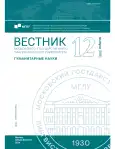НАСКОЛЬКО ПОЛИТКОРРЕКТНА ПОЛИТКОРРЕКТНОСТЬ В АФРИКАНСКИХ СТРАНАХ?
- Авторы: Порохницкая Л.В.1, Мищенко Е.Ю.1
-
Учреждения:
- Московский государственный лингвистический университет
- Выпуск: № 12(893) (2024)
- Страницы: 77-84
- Раздел: Языкознание
- URL: https://bakhtiniada.ru/2542-2197/article/view/291757
- ID: 291757
Цитировать
Аннотация
Основным камнем преткновения современной теории политкорректности следует считать выработку унифицированной языковой политики в отношении людей с ограничениями по здоровью, которая бы, с одной стороны, отражала существующие международные директивы в этой сфере, а с другой стороны, вписывалась в реалии конкретных социумов. Цель настоящего исследования - разработать алгоритм выявления и описания лингвокультурологических и концептуальных моделей номинации людей с инвалидностью в англоязычных странах Африки. Для достижения поставленной цели применялся комплекс методов, в частности, метод концептуального анализа, метод дефиниционного анализа, метод лингвокультурологической интерпретации единиц и метод корпусного анализа. В результате проведенного исследования были реконструированы фреймы эвфемистической и дисфемистической номинации инвалидности в англоязычных странах Африки, которые, отражая лингвокультурную специфику местного массмедийного дискурса в области здравоохранения, в целом соответствуют общепринятым стандартам англоязычных стран.
Об авторах
Лидия Васильевна Порохницкая
Московский государственный лингвистический университет
Автор, ответственный за переписку.
Email: lidie@list.ru
Доктор филологических наук, доцент, профессор кафедры лексикологии английского языка факультета английского языка Московского государственного лингвистического университета
РоссияЕлизавета Юрьевна Мищенко
Московский государственный лингвистический университет
Email: misch.liz@mail.ru
преподаватель кафедры лексикологии английского языка факультета английского языка Московского государственного лингвистического университета
РоссияСписок литературы
- Остроух А. В. «Политическая корректность» в США: культурологический аспект проблемы : автореф. дис. ... канд. культурологии. М., 1998.
- Цурикова Л. В. Политическая корректность как социокультурный и прагматический феномен. Воронеж, 2001.
- Тер-Минасова С. Г. Язык и межкультурная коммуникация: учебное пособие для студентов, аспирантов и соискателей по спец. «Лингвистика и межкультурная коммуникация». М.: Слово/Slovo, 2000.
- Панин В. В. Политическая корректность как культурно-поведенческая и языковая категория : автореф. дис. ... канд. филол. наук. Тюмень, 2004.
- Шишова Е. В. Дисфемия в современном российском и американском политическом дискурсе: автореф. дис. ... канд. филол. наук. Казань, 2017.
- Бех Е. Ф. Феномен дисфемизма в современном англоязычном художественном дискурсе: дис. … канд. филол. наук. Белгород, 2022.
- Ковшова М. Л. Семантика и прагматика эвфемизмов // Краткий тематический словарь эвфемизмов. М. : Гнозис, 2007. С. 105.
- Warren B. C. What Euphemisms Tell Us about the Interpretation of Words // Studia Linguistica. 1992. Vol. 46 (2). P. 128–172.
- Ayto J. Wobbly bits and other euphemisms. London: A & C Black, 2007.
- Pinker S. The Blank Slate: The Modern Denial of Human Nature. New York: Viking Press, 2002.
- Ladau E. Four Disability Euphemisms that Need to Bite the Dust. URL: https://drcnh.org/rap-sheet/four-disability-euphemisms-that-need-to-bite-the-dust/.
- Порохницкая Л. В. Концептуальная подоплека современных политкорректных трендов: новое или хорошо забытое старое? // Вестник Московского государственного лингвистического университета. Гуманитарные науки. 2022. Вып. 8 (863). С. 86–90.
Дополнительные файлы











